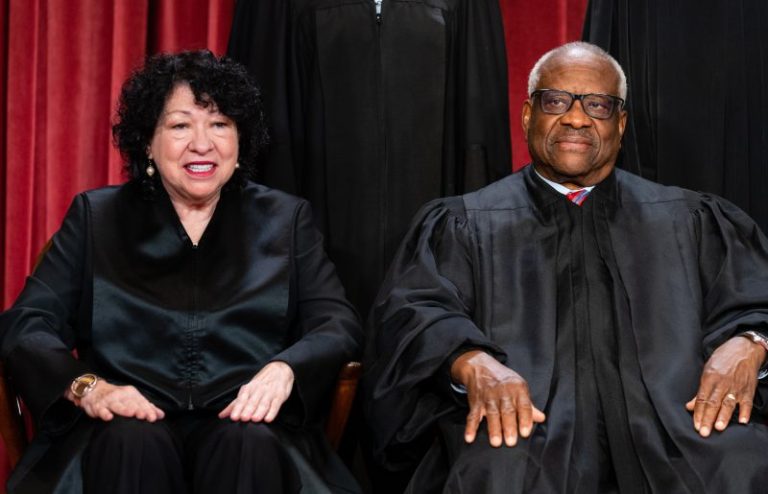Just six years apart in age, Supreme Court Justices Sonia Sotomayor and Clarence Thomas each experienced racism and poverty in childhood: Sotomayor in public housing in the Bronx and Thomas in an impoverished Black community in coastal Georgia.
They sat side by side — the court’s first Latina justice and second African American justice — behind the raised mahogany bench on Thursday, offering passionately conflicting views on the decision rejecting race-conscious programs in college admissions.
Both Thomas and Sotomayor benefited from affirmative action, winning coveted spots in the same elite law school. But the two justices drew completely different lessons from their experiences.
“Treating anyone differently based on skin color is oppression,” Thomas, 75, said from the bench after Chief Justice John G. Roberts Jr. finished reading a summary of the landmark opinion. It was the first time in three decades on the court that Thomas felt so strongly about an issue he was compelled to share his concurring views in the courtroom.
Sotomayor, 69, felt strongly too. “Ignoring racial inequality,” she said, “will not make it disappear.”
Thomas has written that, after graduating from Yale Law School, he felt racial preference had “robbed my achievement of its true value.” In contrast, Sotomayor has called herself the “perfect affirmative action child” and said the practice opened doors for her at Princeton and Yale, where she excelled alongside her more privileged peers.
Their polite yet pointed exchange on Thursday stretched for more than 30 minutes, touching on the Constitution and historical and present-day racism. Perhaps because it is not publicly known in advance which decisions will be announced when, the courtroom was not entirely filled to hear the extraordinary back-and-forth. But the seven other justices listened intently.
Reading prepared remarks in his strong baritone, Thomas, the court’s longest-serving justice, said his colleagues for too long had allowed universities to ensure a particular racial mix in their entering classes. Such practices, Thomas said, “fly in the face of our colorblind Constitution.”
Thomas alluded to his experiences growing up in the segregated South, drawing a contrast to circumstances for today’s high school seniors, who he said should not be penalized — or given an advantage — because of the color of their skin. When universities ask students to check boxes identifying their race, he said, it assumes that all students of a particular race think alike.
“We are all equal and should be treated equally,” he said. “We are not all inexorably trapped in a fundamentally racist society.”
Affirmative action, he added, “only highlights our racial differences with pernicious effect.”
Thomas recounted the nation’s history of discrimination against Asian Americans, including the U.S. internment of Japanese Americans during World War II, and compared it to discrimination against African Americans in the South.
“Two discriminatory wrongs cannot make a right,” Thomas said of the accusations that Harvard discriminated against Asian American applicants to the benefit of Black and Latino students.
When it was her turn to speak, Sotomayor removed the black mask she has typically worn in court since it reopened this term following the coronavirus shutdown.
She said Thursday’s decision would roll back decades of progress to equalize educational opportunities for historically underrepresented Black and Latino students — and called it an “unjustified exercise of power.” The absence of race-conscious college admissions programs, she said, would decrease the pipeline of racially diverse college graduates to fill leadership roles in a wide range of professions.
Sotomayor also took issue with Thomas’s view of the Constitution, which she said cements a “superficial rule of colorblindness” in a still-segregated society “where race has always mattered and continues to matter.”
She invoked constitutional history and the extension of citizenship to formerly enslaved people via the 14th Amendment, which she said was enacted in a race-conscious way to promote equality. In the years following the decision in Brown v. Board of Education, the landmark case that led to the desegregation of public schools, the court had gone on to permit a limited consideration of race in college admissions to promote racial diversity on college campuses, she noted.
“Racial equality cannot be achieved without making room for underrepresented groups that for far too long were denied admission through the force of law, including at Harvard and UNC,” Sotomayor said.
Sotomayor then gave a nod to a separate written dissent from Justice Ketanji Brown Jackson, who last year became the court’s first Black female justice and on Thursday accused the conservative majority of “ignoring history.”
Jackson did not read a statement from the bench, following the customary practice of deferring to the justice who writes the main dissenting opinion.
Instead, she sat stoically during her colleagues’ remarks, looking straight ahead into the hushed audience. She wore a chunky necklace of white shells strung together with beads, reminiscent of the embellished “dissent” collars Justice Ruth Bader Ginsburg wore to show disagreement.
In closing, Sotomayor said she, Jackson and Justice Elena Kagan were dissenting with “profound sadness.”
She quoted the Rev. Martin Luther King Jr. and struck an optimistic tone, saying progress toward equality would not be halted by the ruling because diversity is now a “fundamental American value.”

